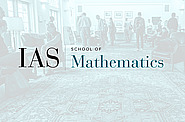2022-2023 Seminars
Apr
04
2023
Computer Science/Discrete Mathematics Seminar II
Hausdorff Dimension Analogues of the Elekes - Ronyai Theorem and Related Problems
10:30am|Simonyi Hall 101 and Remote Access
Apr
03
2023
Computer Science/Discrete Mathematics Seminar I
Common Linear Patterns Are Rare
Nina Kamčev
11:15am|Simonyi 101 and Remote Access
Mar
28
2023
Computer Science/Discrete Mathematics Seminar II
The Lens of Abelian Embeddings
10:30am|Simonyi Hall 101 and Remote Access
Mar
21
2023
Computer Science/Discrete Mathematics Seminar II
Strong Bounds for 3-Progressions: In-Depth
Raghu Meka and Zander Kelley
10:30am|Simonyi Hall 101 and Remote Access
Mar
20
2023
Computer Science/Discrete Mathematics Seminar I
Extremal Problems for Uniformly Dense Hypergraphs
Mathias Schacht
11:15am|Simonyi 101 and Remote Access
Mar
20
2023
Computer Science/Discrete Mathematics Seminar I
Strong Bounds for 3-Progressions
Raghu Meka and Zander Kelley
10:00am|Simonyi 101 and Remote Access
Mar
13
2023
Computer Science/Discrete Mathematics Seminar I
Why Can’t We Classically Describe Quantum Systems?
Chinmay Nirkhe
11:15am|Simonyi 101 and Remote Access
Mar
07
2023
Computer Science/Discrete Mathematics Seminar II
Recent Progress in Randomness Extraction
10:30am|Simonyi Hall 101 and Remote Access
Mar
06
2023
Computer Science/Discrete Mathematics Seminar I
Two (More) Algorithms for Set Cover
Anupam Gupta
11:15am|Simonyi 101 and Remote Access
Feb
21
2023
Computer Science/Discrete Mathematics Seminar II
From Robust Sublinear Expanders to Additive Number Theory via Rainbow Cycles
10:30am|Simonyi Hall 101 and Remote Access
